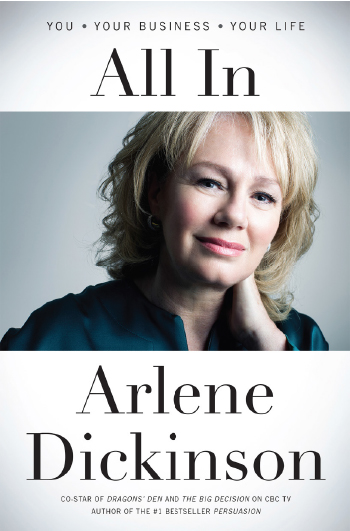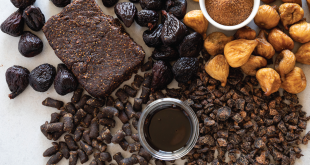
Image courtesy of CBC
Text by Theresa Rogers
It’s early on May 6 and I’m speaking to Arlene Dickinson on the phone from Calgary. Rachel Notley has just won the Alberta provincial election, becoming the province’s 17th premier and forming the first NDP-led government in the history of the province.
Everyone knows it’s been a bumpy few years for Canadian manufacturing, including food manufacturing, and that Alberta has its own financial woes at the moment. I ask if the new government in Alberta will help or hurt business.
“I think there’s lots of room for new policy,” Dickinson says. “I don’t believe that anyone wants to see the economic endowment suffer. I think we all want to grow this province and it seems to me that we have to give the new premier an opportunity to share what kind of policies will actually help us grow. It’s too early to say but I’m hopeful.”
This is the diplomatic but straight-talking woman Canadians know from her eight years on Dragon’s Den. In a way, Dickinson is so much more than a Dragon. She is the marketing genius in charge of Venture Communications, her full-service marketing agency. She is also an author and philanthropist. In another way, she is a Dragon through and through: a fierce, entrepreneurial venture capitalist. It’s who she is.
 Her latest venture is a business accelerator located in downtown Calgary called District Ventures. The first accelerator of its kind in Canada, District Ventures will focus on growing companies in the food and beverage and health and wellness sectors. Dickinson describes the accelerator as a community for driven entrepreneurs where they can network, access strategic investors – she’s in the process of launching a “significant fund” to invest in the companies – and receive the business development support they need to take their business to the next level.
Her latest venture is a business accelerator located in downtown Calgary called District Ventures. The first accelerator of its kind in Canada, District Ventures will focus on growing companies in the food and beverage and health and wellness sectors. Dickinson describes the accelerator as a community for driven entrepreneurs where they can network, access strategic investors – she’s in the process of launching a “significant fund” to invest in the companies – and receive the business development support they need to take their business to the next level.
Canadians are good at many things and we need to celebrate that more, Dickinson says. I know she means there’s much more at stake than the “nice” complex Canadians are known for. It’s about fostering a culture of risk and innovation, and ultimately, economic growth.
“It’s critical that Canadians start to celebrate success,” Dickinson says. “It might sound counterintuitive, but innovation begins by giving people the freedom to fail. As long as you learn from your mistakes, failure is actually a critical step in the entrepreneurial process.”
You’ve invested in a number of food and beverage products. What attracted you to the industry?
At the end of the day, it’s a field that’s in constant demand because we all need to eat and drink, and because our population continues to grow. Nutrition, diet and preventative health are also becoming more and more important as our population gets older and as governments are struggling to finance our health care systems. I also saw a tremendous amount of upside from an investment perspective because of Canada’s strong agricultural and manufacturing base and because our products are so trusted around the globe.
What are you working on now?
I’m in the process of opening an accelerator which is going to be focusing on helping early stage businesses in the food and beverage and health and wellness sectors. It’s very exciting. I think it’s really important to know the Prairies only get six per cent of the venture capital in the country, and I think in particular, this sector gets even less. Food and beverage are so important to our health and wellness that I want to make sure that I can help those companies go and succeed and build into successful, hopefully global, companies.
Do you already have people lined up for it?
We’ve got a list of candidates who’ve applied to enter the accelerator and have reached out to us. Our selection criteria is similar to the due diligence process I do when I’m investing in a company. They need to be a good fit not only in terms of their industry and revenues, but they need to be a good cultural fit. By that I mean, driven entrepreneurs who will be able to contribute to the community by way of their experience. We’ve had applications from across the country and we’re very excited about putting together a good group who can learn from each other, and benefit from the services and support of the accelerator.
Are you partnering with anyone on the accelerator?
I have a number of corporate sponsorships that I’m tremendously excited to announce. They’re going to be central to delivering programming, creating networking opportunities, and contributing to the professionalization of our participating companies. Stay tuned.
Are we going to be seeing more of it? Perhaps on TV?
I have a couple ideas in the works for a TV show, but my priority right now is getting the accelerator up and running and providing our participating companies with an environment that will energize growth and innovation.
Where do companies need most of their help?
It really depends on the stage. We’re looking for the companies in the $1- to $5-million revenue stage already; they’ve started to get some traction. There’s a variety of different areas, but I think at that stage you generally need help in terms of structure, marketing and distribution support. You need to be able to get your product into the market; you need to help make sure people understand that marketing is a very key element that I think gets overlooked sometimes with many accelerators and in Dragon’s Den, that’s the number one thing people said they wanted to use funds for. We learned over time, and really we all know this, that without true support, a true foundation of marketing and distribution, we really can’t get on the shelves and off the shelves. It’s a combination of all of these things.
We’ve come to know you a lot from your time on Dragon’s Den and I think your values come through clearly when you speak and invest. Do they guide every investment you make?
Absolutely. When you’re making investments, it’s not just an exchange of capital for equity; you’re signing up to partner with somebody. You need understand what each party will bring to the table and you need to agree on the goals and vision for the company. Sometimes a relationship in business fails because the expectations aren’t set correctly. The foundation of every business relationship for me is starting off with mutual values and a mutual vision.

Is there anything else that guides your investment decisions, even in terms of who would come into the accelerator?
The accelerator is a unique situation. Obviously we’re looking for strong companies – companies that have demonstrated a track record of success and creative thinking – but we also want entrepreneurs who are going to contribute to the culture, which is one of collaboration, hard work, and innovation. It’s about getting people who want to work together and learn from each other. Collaborating with your peers – other entrepreneurs – is just as important as getting mentorship from entrepreneurs. A business needs a range of ingredients to succeed.
Did anyone mentor you in the food and beverage business along the way?
Because I’ve invested in this space a few times, I’ve had the opportunity to sit with successful entrepreneurs and learn about the industry. From the future of manufacturing to distribution, I’ve been a student of the industry for the past decade. I’ve been fortunate that so many people have taken the time to talk to me about the opportunities and challenges.
Share with us what you think some of the challenges and opportunities are in this sector.
Obviously, marketing and distribution. Distribution is key. You have to get your product out whether it’s through Shopify or some of the digital retail experiences out there, or whether it’s a physical experience in a bricks and mortar location, or whether it’s a delivery experience. No matter what you’re doing, you have to get the product into the hands of consumers and the only way to do that is to find distribution channels that are going to reach your specific consumer. That’s very difficult to do, especially as you’re growing, if you’re a niche product or a specialty product. I actually think niche and speciality products are getting a day in the sun here because that issue is becoming more and more important: the idea of where a product is from. And as that happens, small batch, artisanal, and craft is very appealing. It’s getting distribution but it’s also marketing so that people want to purchase your product.
Do companies need to be online or does it depend on the product and the customer?
I think every product, in some way, needs to be represented online at some point. I don’t think you can avoid, nor should you be, the need that people have to get information about your product. Even if all you post is information on your product, you need to be open and transparent to your consumer. It can be as simple as putting the product on one page so that people can understand more about it to something as complex as mass distribution and telling people where to buy it at retail. You definitely need to have a presence online.
Is marketing in this business unique or similar when compared to other industries?
I think consumer marketing – consumer goods, packaged goods marketing – is unique. In terms of marketing itself, each different product needs its own position and place but you do need to understand trends, what drives consumption behaviours, and what the patterns are regionally and nationally and internationally. Marketing at its basic is about strategy and understanding who your audience is and coming up with tactics to reach them. So yes, it’s unique, as is everything you do in marketing.
Are there any areas that are changing?
One area is consumption behaviour. In North America, people are consuming differently, whether they’re eating out because they’re working more hours, or cooking at home because they want healthier alternatives. There’s a heightened awareness among consumers of the quality and content of the food they’re consuming. As a result, more and more people are buying local, buying fresh, buying artisan, buying organic.
You’ve been very supportive of natural, organic products but there’s no universal standard as to what all this means. I think it’s often misunderstood and mistrusted by the consumer and they do cost more. Is it a growth area or will it go away? What’s the impact?
I think it’s a growth area. As it attracts more consumers it will also attract more regulation but I hope the overall trend has a positive impact on the food and beverage sector. By that I mean, whether it’s 100 per cent organic or not, my hope is that you’ll start to see less chemicals and pesticides being used in the cultivation of the product.
Do you have a general view of where you see the Canadian consumer now in this sector?
We’re starting to see a lot of retailers focusing on regional speciality products. Not every store will carry the exact same thing. I think that’s a growing trend in retail and it’s an interesting opportunity to provide and test products in-store in some cases before it goes to a larger distribution chain. I think Canadians love being outdoors and we connect with nature. I like to think we’re a country that loves farmers and appreciates them because we’re very rural as a nation as well. I would say that Canadians are becoming more and more aware and more thoughtful about food.
If a food manufacturer client came to you, how would you help guide them in their business and provide expertise?
People come to me for different things; for marketing services or for investments. In these two areas, I’m able to help them think through marketing and sales strategy, and I have one of the best teams in the country to execute on those strategies. But I’m tremendously excited about the accelerator we’re building as a tool to help businesses in this space. I’ve invested a lot of time and money to create a space for driven entrepreneurs to collaborate, network, find a strategic investor, and benefit from programming. At the end of the day, I’m investing in entrepreneurs and trying to build an entrepreneurial culture.
How do you give them advice in terms of fads and trends? How do we know if something has health and wellness staying power versus a fad? Look at gluten-free, for example.
Predicting the future is difficult. I probably would have said four or five years ago that gluten-free was a fad and I would have been wrong. But when something starts to become engrained language and culture, when it becomes a social norm, it’s likely transitioned past the fad stage and into the trend stage. So by that loose definition I think something like gluten-free is a trend.
You think it won’t go away?
I think it will evolve. I think gluten might be the entry point into talking about all ingredients and how they impact your health, allergies and changing health patterns. It may be something else next, but its point is left behind.
What do people really need to know to get into the business?
It’s the same things you need to get into any business. They need to know that they need to have more money, energy and passion than they believe. Nothing is different in the health and wellness business or the food business or the beverage business. It’s going to take you a lot of energy. It’s going to take you more time than you thought. Probably more energy than you expected. It’s hard work. It’s super rewarding and you have to persevere through and, in particular, you have the challenges that the food industry has, which is everything from health and safety through to consumer adoption through to distribution. There are some unique issues there. You’ve got to be ready for it. You can’t just have the best sauce in the world because your mom made it and think you’re going to sell a million cases of it. It doesn’t happen that way without an incredible amount of things lining up to get it where it needs to be. It’s not that you can’t do it; it’s just not easy to do.
How is social media shaping the food and beverage environment?
Bloggers, people talking about your products, support from the different interest groups or market segments you speak to is critical. I think that social media is a sales tool as well as a communication tool. It’s evolving. You can buy straight from Instagram, you can advertise and purchase through Twitter and Facebook and all of these things are evolving into sales platforms and it’s important to understand how to best utilize it. Think about Pinterest for food. It’s gigantic. I don’t know if it’s been converted yet into a place that people find en masse but I think it certainly will go there.
And it definitely needs to be managed.
Yes and it’s not managed by your daughter or sister or cousin in the basement. It’s managed by somebody who listens to and understands social environments and understands your brand. A dedicated person.
You work with Breakfast Club of Canada. Do you worry about people globally having enough food to eat?
Food is a basic human right. And the notion that there are children in Canada and around the world going to school without it is troubling to me. That’s why I got involved with the Breakfast Club of Canada. Kids need to be fed well in order to be educated well. If our children are the drivers of Canada’s future prosperity, we need to ensure they’re receiving the tools they need to become the next generation of leaders.
You have said the opportunity to be a Dragon made some of your dreams come true. What were those dreams?
I’m very grateful for Dragon’s Den because it gave me a chance to do things I just couldn’t have done otherwise. It afforded me opportunity to meet entrepreneurs from every corner of the country. It reinforced my faith in Canadians. Their hard work and ingenuity never cease to amaze me. The investment side of the show made me a stronger businesswoman. It was an unexpected experience that left a mark on me as a businesswoman, a person, and a Canadian, and I’m grateful for that.
Aside from the accelerator, what else is next for you?
I’m in the process of launching a significant fund to invest in companies in the health and wellness and food and beverage spaces. This is a major thing. We’ve got to invest in these companies. We’ve got to provide growth capital to these types of organizations and innovative ideas.
And grow them in Canada.
Yes, and grow them from Canada. It’s exciting.
 Canadian Food Business
Canadian Food Business




